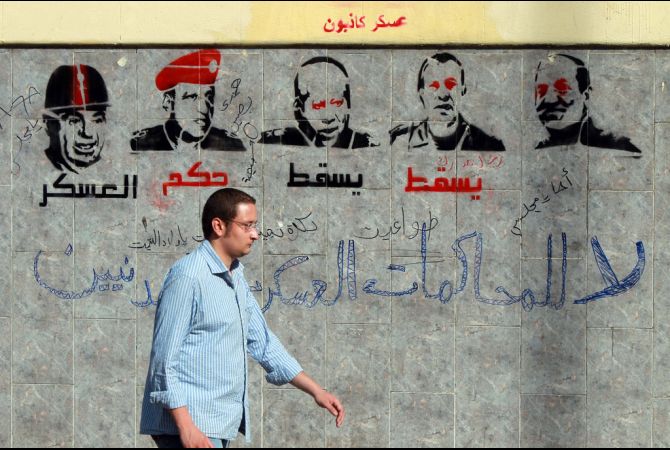
The No Military Trials for Civilians group called on the 50-member Constituent Assembly, tasked with amending the 2012 constitution, to vote against a draft article that would sanction the military trial of civilians.
“Committee members have only two choices: either vote ‘no’ on the proposed text in the article and fight a real battle for the total ban of military trials for civilians,” said the group in a statement, “or waste the right of Egyptians to justice and follow those who preceded them, who wrote the 2012 constitution, who fell, and fall with them,” it added in reference to the Muslim Brotherhood.
In the Monday statement, the group accused the assembly of “repeating the Brotherhood’s crime in their constitution” and was even considering expanding situations in which civilians could stand before military tribunals.
Article 174 in its current form says the military judiciary has authority to rule in cases relating to the Armed Forces, its officers, its personnel, and those in its jurisdiction. Military courts would also have power to take on cases in situations in which members of General Intelligence commit alleged crimes.
The addition of “those in its jurisdiction,” according to No Military Trials, would constitutionally legitimise trying civilian workers in military factories, and children and students in military academies in military courts. The statement also said the article would provide protection to members of the General Intelligence from having to stand in civil courts for crimes against civilians.
The draft article also dictates that military tribunals be used in the case of a direct assault on military installations, camps, areas, borders, equipment, vehicles, weapons, documents, military secrets, public funds, or military factories.
The group warned that this aspect of the draft article would mean military trials would be used when dealing with anything belonging to the Armed Forces, an institution which owns a wide range of assets including wedding halls, clubs, hotels, and petroleum stations. The article could also be widely implemented in specific governorates or areas of the country that are largely under the control of the military.
The inclusion of “military secrets” in draft Article 174 would open the door to restricting the freedom of the press and freedom of information, said the group, and would contradict the provisions of draft Article 50. The statement added that the article would protect the armed forces’ economic interests and would not subject its favourites and management to civilian courts.
“Each of these points and the flimsy excuses offered by members of the committee who supported this text confirmed that the majority of the members of the [Constituent Assembly] sided with the interests of the military establishment and chose its side against the victims of military trials of civilians,” said the statement.
The No Military Trials for Civilians group had previously condemned the preliminary passage of the article last week, and named the members of the committee that had previously said they opposed the military trial of civilians.
Article 174 was proposed by the Armed Forces’ representative in the assembly and passed with 30 votes in favour and only seven votes against it.
No Military Trials for Civilians had attending a listening session in September and had called upon the assembly to implement a complete ban on civilians standing before military tribunals.
Last week Al-Dostour Party condemned the draft article, saying it was “astonished” that the assembly had preliminary agreed to it and called it a “drastic mistake.”
Military trials were sanctioned in the 2012 constitution and continued during Egypt’s transitional period following the ouster of former President Mohamed Morsi.
Earlier this month 12 pro-Morsi protesters were sentenced to 17 years each following a speedy military trial for taking part in a violent student protest at Al-Azhar University.
Journalists Mohamed Sabry and Ahmed Abu Deraa had received suspended sentences for their work in Sinai.
The Constituent Assembly is set to make a final decision regarding draft Article 174 this week.

